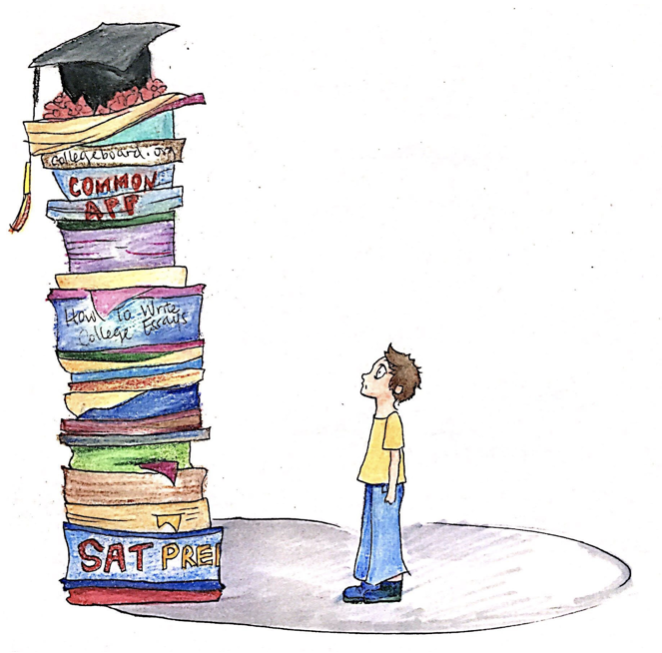How COVID-19 is Impacting College Admissions
COVID-19 has continued to make the college application process even more draining for college applicants with numerous complications thrown ahead.
October 3, 2020
Globally, COVID-19 has changed the typical process that high school seniors and applicants go through. However, this unexpected scenario has changed the process of the college application and even the admissions of students. For instance, for certain schools, test scores are now optional, students’ extracurriculars are at a halt or have been canceled, and many more students are seeking financial aid.
Over a whopping 700 colleges have become test-optional due to this circumstance including all Cal State Universities and UC Universities. However, many students are still seeking an opportunity to take the SAT or ACT to improve their chances of becoming admitted. A plethora of SAT and ACTs have been canceled since the wake of the coronavirus pandemic creating a more troubling situation for students as application deadlines are creeping up.
International students are especially struggling with this situation since ACT test dates have been canceled for December 2020 and February 2021. Therefore, international students that want to take the tests may need to rush their original plans to take the ACT in September and/or October 2020 to be qualified to submit their scores for early action or decision applications. In addition, another alternative is considering switching to taking the SAT instead of the ACT. Flexible testing policies have arisen for countries not offering Test of English as a Foreign Language (TOEFL) or International English Language Testing System (IELTS) exams for non-native English speakers, and instead is allowing students to show English proficiency from testing online through Duolingo.
However, there have been rumors that colleges may extend application deadlines or test submissions for the class of 2021. Colleges have already extended deadlines for transfer applications, and students applying for graduate programs, leading to students predicting the same will happen for undergraduates. In addition, some colleges are allowing deadlines to be adjusted if students email the college, stating how they have been personally impacted by COVID-19 and colleges deeming it as an appropriate reason why the college should extend their deadline.
Numerous students have a semester or more worth of extracurriculars being canceled or postponed, such as sports, volunteering, theater, and more. However, others became resourceful, exploring extracurriculars digitally. “Even with the uncertainty of the upcoming college admissions, this summer I still took advantage of virtual opportunities to volunteer and participate in extracurriculars like I would have normally done” Katie Ikemoto (12)elaborates, feeling satisfied with what was accomplished during this limited time. This circumstance may impact their chances of becoming accepted due to opportunities taken away that can boost one’s application. For instance, by the time students’ physically return to school, allowing them to compete in competitions and win awards, the deadline for applications may pass, losing the chance to appear as a stronger applicant and stand out.
Also, schools have canceled college visits, and numerous college campuses are closed. However, for the select campuses that remain open, stepping on campus does not emulate the same sensation of a school’s atmosphere since there are very few people at the campus. Schools persevering to simulate visiting campus have given the alternative options of virtual tours or information sessions. Yet, select colleges and universities outside of the United States have opened, allowing campus visits since their COVID-19 cases are more controlled than the United States.
Waitlist students this admission cycle are predicted to have a higher possibility of becoming admitted because it is expected a higher number of students to rescind their acceptance. Accepted students are less likely to commit because many can not visit campus and get a feel for the school, creating a dip in their waitlist. Schools with high international student rates such as Georgetown and NYU will see a drop in international students applying. Since students may feel more comfortable being close to home during these unprecedented times and with the United States having the most coronavirus cases globally, international students staying in their home country may be a safer option. Therefore, with less international students applying, this makes it easier for US students to be admitted.
Another reason for a higher possibility of becoming admitted, particularly those in a more fortunate economic situation, is others’ financial conditions. Since many will have difficulty paying for college, especially during this economic crisis, more students will be seeking financial aid or will need to apply to schools with less expensive tuition. However, need-blind schools, such as Stanford and Princeton, will be predicted to see a significant increase of applicants, resulting in acceptance rates to drop.
During these unprecedented times, COVID-19 has shifted the learning atmosphere and the demanding process of applying for colleges. With SAT and ACTs frequently being canceled, select schools becoming test-optional, college visits postponed, and students struggling to find a way to pay for their tuition creates an even more stressful time for the high school seniors applying. However, these obstacles should not cease the hard work put in the three years before. Students should not feel discouraged but rather motivated to finish their final year in high school strong and feel enthusiastic about the new chapter that lies ahead of them.




































Katelyn Ruggles • Oct 7, 2020 at 9:58 PM
The topic of this article is very useful since high schoolers during this time are going to have different admission requirements. It is very informative for juniors and seniors to prepare for college admissions and know how they are going to be altered due to the virus.